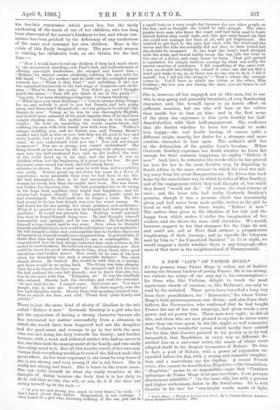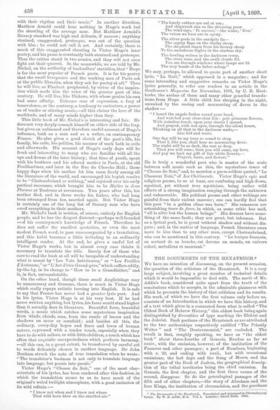A NEW " LIFE " OF VICTOR HUGO.*
AT the present time, Victor Hugo is rather out of fashion among the literary leaders of young France. He is too strong, too violent, too noisy—if one may say it, too commonplace— for those who, like Verlaine, delight to touch the most mysterious chords of emotion, or, like Mallarme, can only be read by the initiated. These poets have travelled a long way from their grandfathers, the " Romantics," for whom Victor' Hugo's bold picturesqueness was divine ; and also from their fathers, the Parnassiens, who confessed that he had taught France the use of her own language, had given words a new power, and set poetry free. These men were right ; he did all this, and those who are now pleased to say that he never wrote more than one true poem in his life, might as well remember' that Verlaine's wonderful verses would hardly have existed but for him, that Gautier pointed to his poetry as in its way unequalled, that Baudelaire, in every way so different, de- scribed him as a universal artist, the music of whose verse adapted itself to the deepest harmonies of Nature. He was, in fact, a poet of Nature, with a power of expression un- equalled before his day, with a strong and romantic imagine.- tion, and a marvellous ear for rhythm. A recent French critic, who cannot be described as Hugadire—(the translation, " Hugolater," seems to us impossible)—says that " l'instinct rytbmique de Victor Hugo n'est pas excellent ; it est presque absolument infaillible." On the same side, but with a greater and higher enthusiasm, listen to Mr. Swinburne. He is with Gautier in' his love for "sun-bright words, words of light, * Victor Hugo a Rauh of his Life and Work. By J. Pringle Nichol, London : Swan Soimeasobein and Co. 1893. with their rhythm and their music." In another direction, Matthew Arnold could hear nothing in Hugo's work but the shouting of the average man. But Matthew Arnold's literary standard was high and delicate, if narrow; anything strained, exaggerated, grotesque, was out of the question with him ; he could not call it art. And certainly, there is much of this exaggerated shouting in Victor Hugo's later poetry, and his prose is constantly both strained and grotesque. Thus the critics stand in two armies, and they will not soon fight out their quarrel. In the meanwhile, we are told by Mr. Nichol, on the authority of booksellers' statistics, that " Hugo is far the most popular of French poets. It is for his poetry that the small bourgeoisie and the working men of Paris ask at the public libraries, when they ask for poetry at all." Thus he will live, as Flaubert prophesied, by virtue of the inspira- tion which made him the voice of the greater part of this century. He will live, like Dickens, with whose genius his own had some affinity. Extreme ease of expression, a fury of benevolence, or the contrary, a tendency to caricature, a power as of tender or stirring music,—all this claims the love of the multitude, and of many minds higher than they.
This little book of Mr. Nichol's is interesting and fair. He does not very deeply commit himself on either side of the fray, but gives an unbiassed and therefore useful account of Hugo's influence, both as a man and as a writer, on contemporary France. He also gives a good sketch of the poet's life, his family, his exile, hie politics, his manner of work both in exile and afterwards. His account of Hugo's early days will be fresh and interesting to many who are familiar with all the ups and downs of the later history; that time of youth, spent with his brothers and his adored mother in Paris, at the old Feuilla.ntines, and later in the Rue du Cherche.Midi ; those happy days when his mother let him roam freely among all the literature of the world, and encouraged his boyish resolve to be "Chateaubriand or nothing," and rejoiced over his early poetical successes, which brought him to be Maitre es Aux Floraux at Toulouse at seventeen. Two years after this, his mother died, and in three weeks his father, who had long been estranged from her, married again. But Victor Hugo is certainly one of the long list of literary men who have owed everything to their mothers.
Mr. Nichol's book is written, of course, entirely for English people, and he has the deepest distrust—perhaps well founded —of his countrymen's knowledge of French. Therefore he does not suffer the smallest quotation, or even the most modest French word, to pass unaccompanied by a translation, and this habit becomes a little irritating to an ordinarily intelligent reader. At the end, he gives a useful list of Victor Hugo's works, but in almost every case thinks it necessary to translate the title. Surely few of those who care to read the book at all will be incapable of understanding what is meant by "Les Voix Interieures," or " Les Fenilles d'Automne," or " L'Art Grand-pore," which suffers oddly, by-the-by, in its change to "How to be a Grandfather," and is, in fact, untranslatable.
On the other hand, though these small Anglicisings may be unnecessary and tiresome, there is much in Victor Hugo which really repays artistic turning into English. It is safe to say that France has never had a greater lyric poet. And in his lyrics, Victor Hugo is at his very best. If he had never written anything but lyrics, his fame would stand higher than it actually does in literature. Beautiful form, beautiful words, a music which catches some mysterious inspiration from winds, clouds, seas, from the rustle of leaves and the shadows on moor or cornfield ; and besides all this, the ordinary, every-day hopes and fears and loves of human nature, expressed with a tender touch, especially when they have to do with sailors, or with little children, a touch which has often that exquisite unexpectedness which perfects harmony, —all this can, to a great extent, be transferred by careful art to words delicately chosen in another language. Sir John Denham struck the note of true translation when he wrote : "The translator's business is not only to translate language into language, but poesie into poesie."
Victor Hugo's " °hoses du Soir," one of the most char- acteristic of his lyrics, has been rendered after this fashion, in which the translation seems to us to have much of the original's weird twilight atmosphere, with a good imitation of its wild refrain :- " I know not when and I know not where
That wild horn blew on the startled air." "The lonely cutters are out at sea ; And shipwreck sits on the shivering prow.
The wind says,' To morrow,'—the water, 'Now.'
The voices we hear are in agony.
The silver pools in the sandpits lie—
The osprey flaps on the chalky steep. The shepherd stares from his drowsy sheep To the monstrous flights in the starless sky.
The howling wolves in the darkness creep, The river runs, and the swift clouds flit.
You see through windows where lamps are lit The rosy heads of the babes asleep."
We may, perhaps, be allowed to quote part of another short lyric, " La Nuit," which appeared in a magazine ; and for some interesting and suggestive remarks on Victor Hugo's lyrics generally, to refer our readers to an article in the Gentleman's Magazine for November, 1891, by C. E. Meet- kerke, the author of these and many other graceful transla- tions from Hugo. A little child lies sleeping in the night, =waked by the cooing and murmuring of doves in the shadow :-- " I heard the angels flutter round your head,
And watched your close-shut lids : pale primrose flowers, With noiseless touch, upon your sheets I spread, And prayed, with wet eyes, through the silent hours, Thinking on all that in the darkness waits,— Lies hid and waits.
One day will be my turn so sound to sleep That I, like you, shall hear no murmuring dove: The night will be so dark, the rest so deep.
Then you will come, then you will come, my love, And pay me back my gift of fair white flowers,—
Prayers, tears, and flowers."
He is truly a wonderful poet who is master of the scale between soft music such as this, the mysterious tones of " °hoses du Soir," and, to mention a poem seldom quoted, " Le Chasseur Noir," of Les Chdtiments. Victor Hugo's epic and religious poems, to us at least, are confusing and high-flown, mystical, yet without true mysticism, being rather wild efforts of a strong imagination ranging through the unknown and unknowable. His political poems and other writings are painful from their violent rancour ; one can hardly feel that this poet " in a golden clime was born." His romances are astonishing tours de force, in which, as some critic has said, "all is alive but the human beings." His dramas have some- thing of the same fault; they are great, but inhuman. But as a lyrical poet, he is great without shadow and without dis- pute; and, in the matter of language, French literature owes more to him than to any other man, except Chateaubriand, who can be mentioned in this century. "Le lexique francais, en sortant de sa bouche, est devenu un monde, un univers color6, melodieux et mouvant."



































 Previous page
Previous page